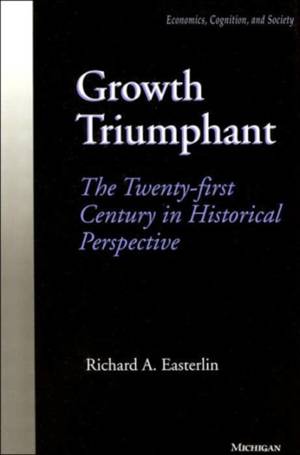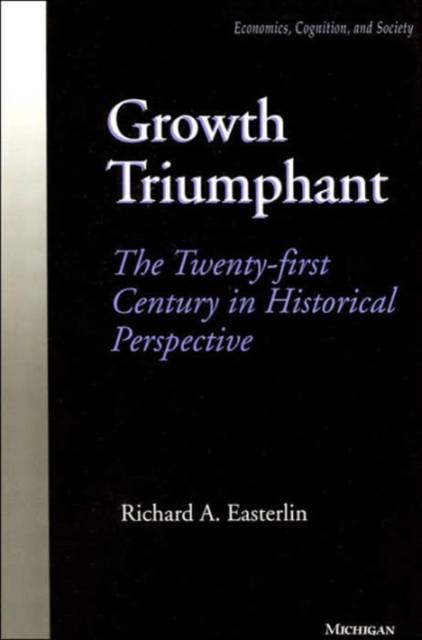
- Afhalen na 1 uur in een winkel met voorraad
- Gratis thuislevering in België vanaf € 30
- Ruim aanbod met 7 miljoen producten
- Afhalen na 1 uur in een winkel met voorraad
- Gratis thuislevering in België vanaf € 30
- Ruim aanbod met 7 miljoen producten
Zoeken
€ 33,45
+ 66 punten
Omschrijving
Taking a longer view than most literature on economic development, Richard A. Easterlin stresses the enormous contrast between the collective experience of the last half century in both developed and developing countries and what has gone before. An economic historian and demographer, the author writes in the tradition of the "new economic history," drawing on economic theory and quantitative evidence to interpret the historical experience of economic theory and population growth. He reaches beyond the usual disciplinary limits to draw, as appropriate, on sociology, political science, psychology, anthropology, and the history of science. The book will be of interest not only to social scientists but to all readers concerned with where we have been and where we are going.
". . . Easterlin is both an economic historian and a demographer, and it is the combination of these two disciplines and the fine balance between theory and experience that make this well-written, refreshingly optimistic book excellent reading." --Population and Development Review
"In this masterful synthesis, Richard Easterlin draws on the disciplines of economic history, demography, sociology, political science, psychology, and the history of science to present an integrated explation of the origins of modern economic growth and of the mortality revolution. . . . His book should be easily accessible to non-specialists and will give them a sense of why economic history can inform our understanding of the future." --Dora L. Costa, Massachusetts Institute of Technology, EH.Net and H-Net
"Growth Triumphant is, simply, a fascinating book. Easterlin has woven together a history of economic growth, economic development, human mortality and morbidity, the connections each has with the others, and the implications of this nexus of forces on the future. . . . This book deserves a wide audience." --Choice
"In what must surely be the most fair-minded, well-balanced, and scrupulously reasoned and researched book on the sensational subjects implied in its title--the Industrial Revolution, the mortality and fertility revolutions, and the prospects for future happiness for the human race--Professor Easterlin has set in place the capstone of his research career." --Journal of Economic History
Richard A. Easterlin is Professor of Economics, University of Southern California.
". . . Easterlin is both an economic historian and a demographer, and it is the combination of these two disciplines and the fine balance between theory and experience that make this well-written, refreshingly optimistic book excellent reading." --Population and Development Review
"In this masterful synthesis, Richard Easterlin draws on the disciplines of economic history, demography, sociology, political science, psychology, and the history of science to present an integrated explation of the origins of modern economic growth and of the mortality revolution. . . . His book should be easily accessible to non-specialists and will give them a sense of why economic history can inform our understanding of the future." --Dora L. Costa, Massachusetts Institute of Technology, EH.Net and H-Net
"Growth Triumphant is, simply, a fascinating book. Easterlin has woven together a history of economic growth, economic development, human mortality and morbidity, the connections each has with the others, and the implications of this nexus of forces on the future. . . . This book deserves a wide audience." --Choice
"In what must surely be the most fair-minded, well-balanced, and scrupulously reasoned and researched book on the sensational subjects implied in its title--the Industrial Revolution, the mortality and fertility revolutions, and the prospects for future happiness for the human race--Professor Easterlin has set in place the capstone of his research career." --Journal of Economic History
Richard A. Easterlin is Professor of Economics, University of Southern California.
Specificaties
Betrokkenen
- Auteur(s):
- Uitgeverij:
Inhoud
- Aantal bladzijden:
- 216
- Taal:
- Engels
- Reeks:
Eigenschappen
- Productcode (EAN):
- 9780472085538
- Verschijningsdatum:
- 7/10/1998
- Uitvoering:
- Paperback
- Formaat:
- Trade paperback (VS)
- Afmetingen:
- 151 mm x 228 mm
- Gewicht:
- 358 g

Alleen bij Standaard Boekhandel
+ 66 punten op je klantenkaart van Standaard Boekhandel
Beoordelingen
We publiceren alleen reviews die voldoen aan de voorwaarden voor reviews. Bekijk onze voorwaarden voor reviews.











